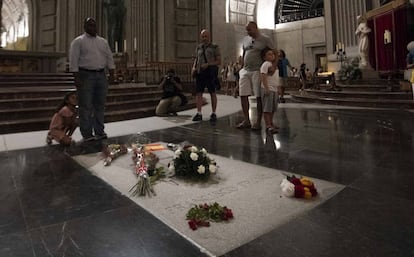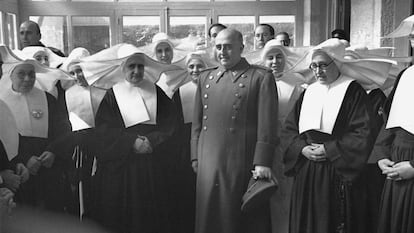Franco’s family promises to exhaust “all legal avenues” to stop exhumation
The relatives of the dictator have refused to support the decree to remove the body, which was approved by the Spanish Cabinet on Friday

The family of former Spanish dictator Francisco Franco has warned it will use “all legal avenues” to stop his exhumation from the Valley of the Fallen memorial site, north of Madrid. The announcement comes after the Cabinet approved a legislative decree from the Socialist Party (PSOE) that will add a pair of articles to the Historical Memory Law to legally safeguard the exhumation.
Speaking on Friday, Deputy Prime Minister Carmen Calvo said that “the decree will permit the exhumation of the remains of the dictator Francisco Franco from the place where the victims of the conflict lie,” in reference to the Spanish Civil War (1936-39).
This is an act of retrospective revenge without precedent in the civilized world Franco family
Franco’s family has strongly opposed the decision, arguing that “under no circumstance” will it “passively or actively” take part in the exhumation. In a press release published Saturday, the Martínez-Bordiú Franco family announced its “strong and unanimous opposition” to any removal or transfer of the dictator’s remains and promised to exhaust “all legal avenues” to stop it from going ahead.
The family members claim they are the only ones with the legitimate right to decide the fate of their grandfather’s body and described the legislative decree as an “act of retrospective revenge without precedent in the civilized world.”
The family added that if “the exhumation takes place without our consent, we will demand the remains so that we can take them to a Christian burial ground.”
In an interview with the Spanish newspaper La Razón, Francis Franco, the grandson of the dictator, ruled out burying Franco’s body alongside his mother Carmen Polo in the family crypt in El Prado for security reasons.
Franco’s relatives will have 15 days to take charge of the remains of the former dictator, and should they fail to do so, the Spanish government will choose a “dignified and respectful” place for him to be reinterred, said Calvo.

“A dictator cannot be in the place of honor”
While Franco’s family is opposed to the exhumation, former Spanish Prime Minister José Luis Rodríguez Zapatero has praised the decision as “extraordinarily positive.” Speaking on Sunday in Lanzarote, the former PSOE leader said the initiative to remove Franco’s body “consolidates the democratic roots of Spanish society,” explaining that having the remains of a dictator buried alongside his victims is “incompatible with a good democratic legacy.” “A dictator cannot be in a place of honor,” he added.
Under the legislative decree, only the bodies of the victims of the Spanish Civil War will be allowed in the Valley of the Fallen
Spokesperson for the center-right Ciudadanos party Inés Arrimadas described the decree as a “legal mess” and accused the Spanish government of “covering up its terrible management” with headlines.
Javier Maroto, deputy secretary-general of the conservative Popular Party (PP), said the exhumation “does not fit with the Spain of 2018.” According to Maroto, the PP will act on the issue with “absolute indifference.”
Under the legislative decree, the Valley of the Fallen will be a “place of commemoration, remembrance and homage to the victims” of the Civil War and hold only the remains of those killed in the conflict.
Valley of the Fallen
The 13.6-square kilometer Valley of the Fallen site remains hotly contested in a country still struggling to come to terms with the legacy of the fascist dictatorship of Franco, who was the Spanish head of state from the end of the Civil War in 1939 to his death in 1975.
The site was ostensibly built to commemorate all of the victims on both sides of Spain’s bitter and bloody Civil War, and the unmarked remains of more than 33,000 victims of the conflict lie there. But critics point out that the Valley of the Fallen, which features a basilica and a 150-meter-high cross that dominates the surrounding countryside, contains just two marked graves: those of Franco himself and José Antonio Primo de Rivera, the founder of the Falange, Spain’s fascist-inspired political party. At the same time, thousands of prisoners of war who fought against Franco in the civil conflict were among the workforce used in its construction.
English version by Melissa Kitson.
Tu suscripción se está usando en otro dispositivo
¿Quieres añadir otro usuario a tu suscripción?
Si continúas leyendo en este dispositivo, no se podrá leer en el otro.
FlechaTu suscripción se está usando en otro dispositivo y solo puedes acceder a EL PAÍS desde un dispositivo a la vez.
Si quieres compartir tu cuenta, cambia tu suscripción a la modalidad Premium, así podrás añadir otro usuario. Cada uno accederá con su propia cuenta de email, lo que os permitirá personalizar vuestra experiencia en EL PAÍS.
¿Tienes una suscripción de empresa? Accede aquí para contratar más cuentas.
En el caso de no saber quién está usando tu cuenta, te recomendamos cambiar tu contraseña aquí.
Si decides continuar compartiendo tu cuenta, este mensaje se mostrará en tu dispositivo y en el de la otra persona que está usando tu cuenta de forma indefinida, afectando a tu experiencia de lectura. Puedes consultar aquí los términos y condiciones de la suscripción digital.








































